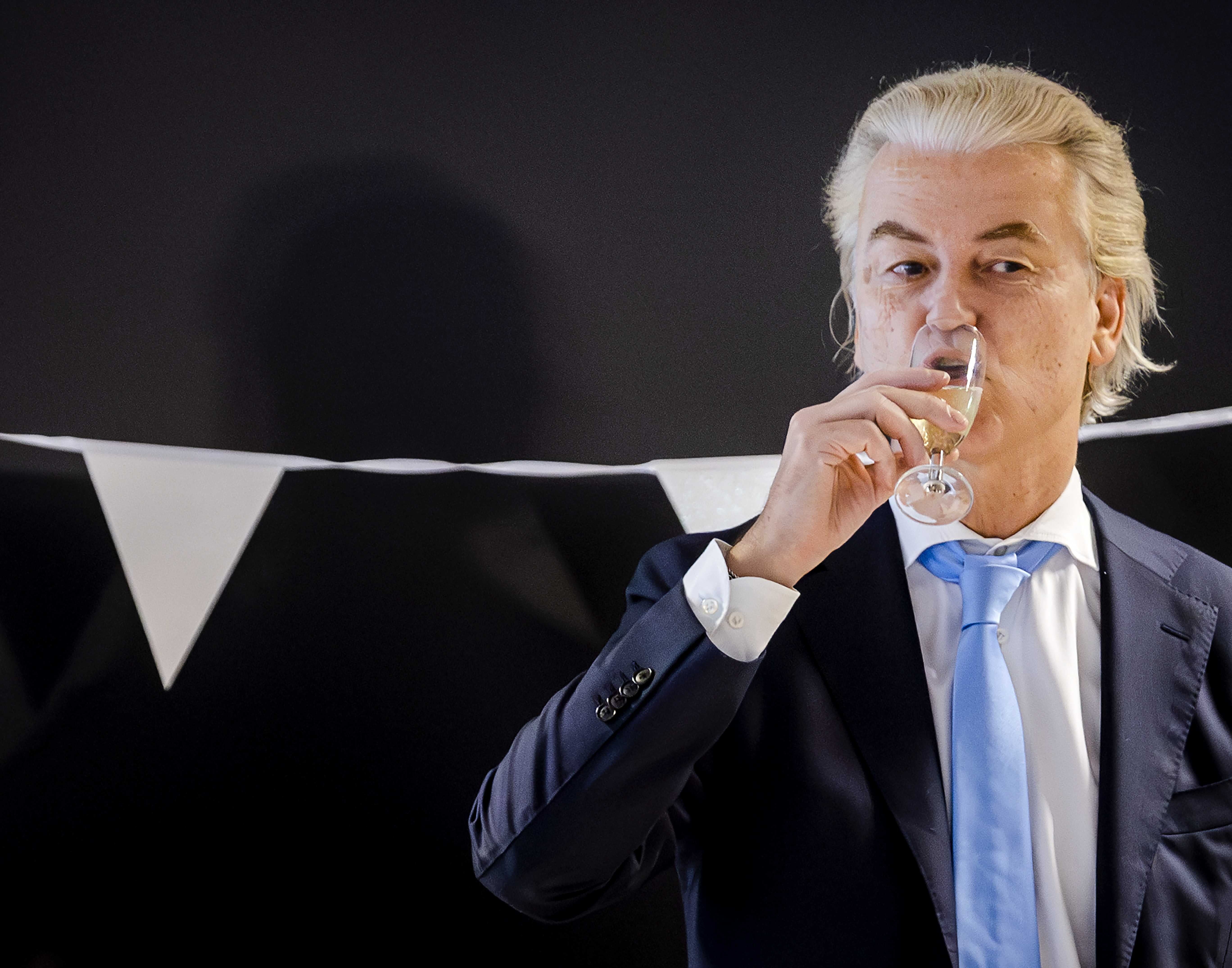How scared should we be of the rise of the ‘Dutch Trump’?
The election triumph of the avowed anti-Islam party leader Geert Wilders tells us a lot about the incendiary state of Europe, writes Mary Dejevsky. But fears of a far-right takeover are no cause to panic – yet


Just when you may have thought that it was safe to turn away from the vagaries of elections in Europe and focus instead on the many other issues troubling the continent today, voters in the Netherlands have become the latest to fuel fears of an ascendant far right. Easily topping this week’s polls, with 37 parliamentary seats (out of 150), was the Freedom Party (PVV) of the veteran nationalist politician, Geert Wilders. The next, with 25 and 24 seats respectively, were a left-wing alliance (headed by another political veteran, Frans Timmermans), and the centre-right party, followed by a long tail of smaller parties straddling the gamut of politics from right to left.
Wilders has been a fixture of Dutch politics for a long time, entering parliament a quarter of a century ago, and founding his Freedom Party in 2006. While somewhat toning down his anti-Muslim invective this time around, he stood on his familiar platform of hostility to migration, resisting what he sees as the dilution of Dutch national identity, and exit from the EU. But this time, in one major respect, he was knocking at an open door. The coalition that had governed the Netherlands for nearly two years and enabled the Conservative, Mark Rutte, to remain prime minister for a record 13 years, collapsed over a dispute on – hardly a surprise – migration.
The Rutte government had tried, and failed, to bring in stricter limits on asylum claims, in response to public concern about unprecedented numbers and overflowing camps. The small Christian party objected to the prospect of splitting up families if numbers of dependants were limited and, as is the risk with small faith parties, there was to be no compromise. The coalition could not be reconstituted, and the opportunity was created for Wilders to march in. The wonder was perhaps less that his party did so well, than that the margin of his victory – indeed, his victory at all – was not confidently predicted in opinion polls.
It is important, however, not to get carried away with the idea either that the far right is on the threshold of power in the Netherlands or that anything like Nazism – neo, lite, or in any other variant – is rampaging across Europe. The pattern is not uniform, and the reality is that the power, if not always the influence, of the far right remains constrained – often by the very same democratic institutions that allow its candidates to stand for election.
In recent months the trend in Europe has run both ways. In October, Slovakia, a small country (population 5.5 million) gave the Smer party of former prime minister, Robert Fico – a populist nationalist on the model of Hungary’s Viktor Orban – the top slot with 23 per cent of the vote. Only a few weeks later, Poland (38 million) handed victory to the Civic Coalition party of former prime minister and EU president, Donald Tusk, a pro-EU centrist, displacing the nationalist conservative Law and Justice party. The complexion of any coalition government is still not agreed, but the likelihood is that it will be headed by Tusk.
Now, it is possible to argue that Poland bucked the bigger trend. If you look back over the past year or so, then parties on the far right have made gains. But Giorgia Meloni was an exception in sweeping the polls (on a low turnout) to become Italy’s first female prime minister. Even if far-right parties top the polls, they may not head the resulting government or even enter government at all – which is what could yet happen in the Netherlands.
Other parties come together to block their path to power, or they are included in a coalition where something similar happens. Even when they have a share in power, that power is circumscribed. Conservatives won Finland’s election in April, and the nationalist Finns party are in the resulting coalition. In Sweden last year the Social Democrats topped the poll, but Ulf Kristersson of the centre-right Moderate Party has become prime minister of a minority government that relies on a voting arrangement with the right-wing Sweden Democrats.
Nor can reasons other than an ineluctable shift to the far right be ruled out as explaining recent European election results. One might be the liability of incumbency, which might partly be explained in turn by what was widely seen as the inadequate performance of many governments – right or left – during the Covid pandemic, and the general, and seemingly growing, public distrust in government per se.
It has also to be said that the big issue of our day – migration, especially what is termed irregular migration – offers fertile soil to any far-right party. But is it public concern about migration, and frustration at the inability of mainstream parties to reduce the numbers while in power, or is it more that the far right has fanned the flames of xenophobia for its own ends? There is a difference. Russia’s invasion of Ukraine may also have helped to drive opinion in the Nordic countries in particular to the security-orientated right.
The fragmentation of many party systems may also play a part. Some 16 parties are likely to be represented in the new Netherlands parliament. With so wide a choice a party that wins, say, 37 seats in a 150-seat legislature, as Wilders Freedom Party did, may seem to have garnered a lot of support, when in fact it has only 25 per cent of the seats.
It is worth making two more observations. First, in most of the countries where the far right has made gains, or exerts influence, there is invariably a historical strand of domestic politics for it to latch on to, albeit long gone in its original form. In Italy and in France (with the Le Pen family), the roots and antecedents of the far right are all too obvious, as also in Germany, where the Alternative für Deutschland has made gains, especially in the former East.
Something similar is seen in Austria, where Kurt Waldheim was controversially elected president, despite being implicated in Nazi war crimes, and Joerg Haider’s Freedom Party won a share of power – and ostracism from many other EU countries – after taking almost 30 per cent of the 1999 general election vote. The nationalist and anti-migrant right in various guises still has a presence in Austria’s politics. Back in the Netherlands, elections remain haunted by the figure of Pim Fortuyn, a professor turned anti-Muslim activist, who was assassinated by an environmental campaigner during the election campaign of 2002.
And second, a taste of the far right in office may work as an inoculation of sorts. The far-right in Austria has bounced in and out of public favour, although it appears to be on an upswing in advance of elections next year. It has also been spectacularly true in the UK, where the British National Party never regained its popularity after some local election victories more than a decade ago. Its response has been a resort to street politics, as seen recently at Remembrance Day.
All of this adds up to an argument that there should be no reason for panic at what is being described as Wilders’ “dramatic victory” in the Netherlands election. “Victory”, in this case, means winning a quarter, no more, of the Dutch parliament’s seats. There is no certainty that Wilders will become prime minister. If he does, his power will be severely constrained in a coalition, as it will be if he and his party take any other post. Moreover, this “victory” may reflect less any grand sweep of European history veering sharply to the right than public disquiet about migration and ineffective government.
The greater danger might be if the Dutch Freedom Party and others elsewhere of this ilk were squeezed out of the mainstream or banished. At least now, as the result of a democratic election, the Netherlands and the rest of Europe know the score. The common-sense response is surely, as the medics might say, “watchful waiting”, before the EU as a whole votes in parliamentary elections next year.
Join our commenting forum
Join thought-provoking conversations, follow other Independent readers and see their replies
Comments
Bookmark popover
Removed from bookmarks